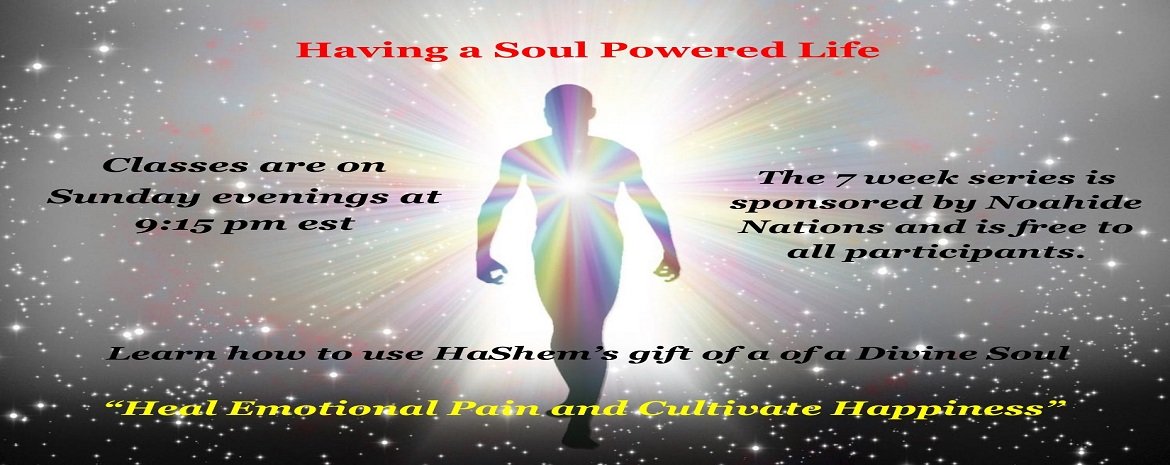Noahide Torah Courses
Noahide Nations has conducted nearly 3000 live online Torah classes over the past 15 years. Many of these classes are available in audio recordings. Here are just some of these courses.
God's Instructions
When God created man on the 6th day He wanted mankind to live in peace and harmony, through His Mercy. He gave Adam 6 instructions in order to live this way. After the flood He gave Noah a 7th. These are the Noahide Commandments.

Read More +
Noahide Prayer
For Noahides, prayer is considered a mitzvah when performed in response to personal needs or circumstances.

Read More +
Develop a Torah Personality
Help for perfecting your relationship with HaShem and yourself.

Read More +
Listen To Noahide Laws & Life Cycle Class
Listen to the overview from a previous class from the Noahide Torah Study Yeshiva Course.

Read More +
Seek Torah Wisdom
Torah wisdom should always flow through you. Learn about Hashem and you will learn about yourself!

Read More +
After The Flood
Ever wonder what happened when Noah and his family exited the Ark after the Flood?
Wisdom From Pirke Avot
Simon the Just…used to say,
“Upon three things the world stands:
On Torah, on (Divine) Service, and on Deeds of Lovingkindness.”
Pirke Avot 1:2
Ben Zoma said,
“Who is wise? The one who learns from all people…
“Who is mighty? The one who subdues the evil inclination…
“Who is rich? The one who rejoices in his portion….
“Who is honored? The one who honors other human beings….”
Pirke Avot 4:1
The Most Important Part of Studying Torah
The most important element in validating interpretations of the written and oral Torah is the concept of Mesorah. Mesorah is the greatest proof to the authenticity of any concept, practice, or interpretation.
Although the seven Noahide laws have their origins in Adam and Noah, God chose to transmit and preserve them via Moses and the giving of the Torah at Sinai. This placed the Seven Mitzvos within the structure and system of Torah study and learning. Therefore, the seven Noahide laws must be interpreted and understood within the context of the Torah.
This point cannot be stressed enough: Jewish, and therefore Noahide, study and interpretation of the Torah is unique and unlike the study of any other religious texts.
The Truth About the Ger
Don't ever be afraid of seeking truth or speaking the truth, as it says in
Proverbs 12:19...
Truthful lips will be established forever, But a lying tongue is only for a moment
Are Noahides Allowed to Pray?
For Noahides, prayer is considered a mitzvah when performed in response to personal needs or circumstances. If one experiences challenges for which he does not pray, his lack of response is tantamount to a denial of God as the sovereign ruler of all things and all events. When one does pray in such circumstances, it demonstrates reliance and belief in the Creator.
When a Noahide prays to give thanks or praise absent a personal need, he still receives reward for such prayer even though it is not of the same nature as prayer prompted by personal needs.
As with all personal prayers, there are no fixed texts for Noahide prayer. Since all Noahide prayer is essentially personal prayer, it is ideally expressed using sincere words from the heart.
Tools For Noahide Torah Study
The journey of Noahide Torah study is endless in depth and has no destination. You will realize this when your very essence proclaims, "the more I learn, the less I know"! Before you make this proclamation remember that it is a mitzvot for a Noahide to study the Noahide Laws and apply them in every aspect of their life. After you make that proclamation you will realize and appreciate why it is a mitzvot for a Noahide to study the Noahide Laws and apply them. The study of Torah is what gives us our awe of the Creator. The more we study the more awe we gain.
Al Chet 19
- Category: Al Chet (Confession)
- Hits: 6844
Exploring the Al Chet Prayer
Rabbi Shraga Simmons
19. For the mistakes we committed before You with the Yetzer Hara (evil inclination).
The Yetzer Hara is that little voice inside each of us that tries to convince us to pursue physical comfort, at the expense of greater spiritual pleasures.
Ask yourself:
- Have I pursued my physical drives for their own sake -- without involving any spiritual dimension?
- Do I resort to the excuse that "I couldn't help myself"?
- Have I studied Torah techniques for channeling physical drives into holiness?
Al Chet # 19
44 Roots of Mistakes
by George Brock
The Sin: The Mistakes we committed before You with the Yetzer Hara (evil inclination).
- The Yetzer Hara is that little voice inside each one of us- that tries to convince us to pursue 'physical comfort'; at the expense of a greater 'Spiritual pleasure'.
The Battle: The 'good inclination' (Yetzer HaTov) {vs} The 'evil inclination' (Yetzer Hara).
The Cause:
- Self discipline- can only be achieved when one realizes one has a 'good' and 'evil' inclination.
- Desires- causes one to confuse (what one is) and (what one desires to become).
- Desires are illusions- Nothing is what it seems to be.
- When one has a sense of- 'doing without', it drives one toward evil. But, When one feels guilty for giving in to that desire, It will drive one back towards good.
The Victory:
- The evil inclination seeks to test itself against the good inclination.
- Evil reaches for one and attacks one from behind.
- Discipline- will remove the 'conflict' within oneself.
- The Victory comes- when one realizes that any 'physical' desire that keeps one from one's 'Spiritual' need, is to many desires.
- Only through T'shuvah can one overcome his forbidden lusts and desires.
The Goal:
- One needs to seek truth, learn it's ways and seek not to change truth, but learn to follow it.
- One also needs to ask G-d for the strength and courage to do the 'right thing', which is the voice of the 'good inclination'. Also one needs to reject the voice of the 'evil inclination' which says 'to do your own thing'.


 French (FR)
French (FR)  English (UK)
English (UK) 

























 Choosing a Rabbi
Choosing a Rabbi What Is Tzedakah?
What Is Tzedakah? The Science in Torah
The Science in Torah Why Study Torah?
Why Study Torah? Afterlife, Moshiach & Redemption
Afterlife, Moshiach & Redemption Your Soul
Your Soul